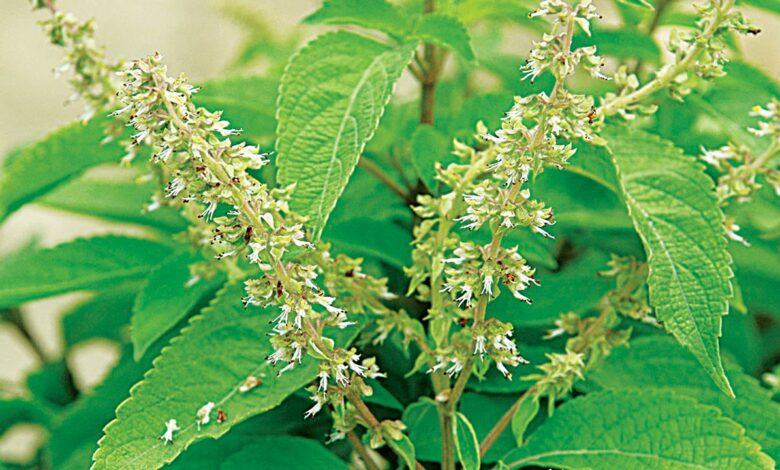
Top 15 Herbal Remedies in Nigerian Culture
Herbal Remedies in Nigerian Culture – Nigeria has a long, rich history of traditional herbal medicine use. Various ethnic groups have cultivated knowledge of local plants and their healing properties over centuries. Herbal remedies in Nigeria are integral to the culture and are still commonly used today. Information Guide Nigeria
Although Western medicine is now widely available in Nigeria, traditional herbal treatments remain popular for certain health conditions. Plants offer a more natural treatment approach with fewer side effects than pharmaceuticals. Herbal medicines are also more accessible and affordable for many Nigerians.
👉 Relocate to Canada Today!
Live, Study and Work in Canada. No Payment is Required! Hurry Now click here to Apply >> Immigrate to CanadaThis article will explore the top 15 herbal remedies that are part of Nigerian culture. From remedies for malaria to skin infections, digestive issues to feminine health concerns, these herbal medicines provide natural healing power. Read on to learn about Nigeria’s herbal heritage and natural solutions to promote wellbeing.
Read Also: Top 15 Herbal Teas for Good Health in Nigeria
Top 15 Herbal Remedies in Nigerian Culture
Here are top 15 herbal remedies in Nigerian culture:
1. Moringa oleifera
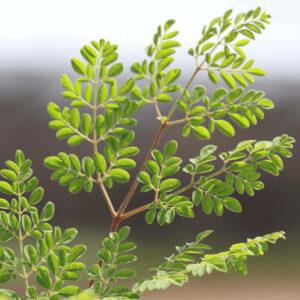
Known as the horseradish tree or drumstick tree, Moringa oleifera is called “Ewe ile” in Yoruba. Nearly every part of the moringa tree has therapeutic uses. Moringa leaves are used to treat fever, bronchitis, eye infections, inflammation and pain relief. The seeds help lower blood sugar and cholesterol. Moringa root and bark have antibiotic and antibacterial effects. Herbal Remedies in Nigerian Culture
Moringa is rich in antioxidants and nutrients like vitamin C, beta-carotene, magnesium and potassium. Its antioxidant, anti-inflammatory, anticancer and immune-boosting properties make moringa a superfood. Adding moringa to soups, stews or tea can help fight infections, diabetes, anemia, arthritis and other ailments.
2. Citrus aurantifolia
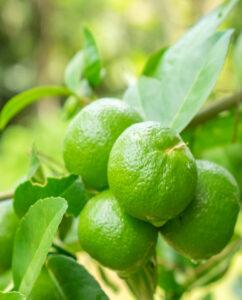
Commonly called lime, Citrus aurantifolia is a small citrus fruit used medicinally in Nigeria. The Yoruba call it “osan wewe.” Lime aids digestion and helps alleviate vomiting, heartburn, nausea and diarrhea. Applying lime juice helps heal wounds, sores, cuts and rashes faster.
Lime has antiviral properties that help fight the cold and flu. The vitamin C in lime also boosts immunity. Lime peel contains antioxidants, while the juice is rich in potassium and vitamin C to support heart health. Sucking a lime or mixing lime juice with water makes a refreshing, healthy drink.
3. Carica papaya
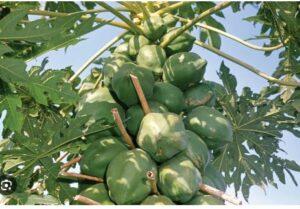
Called “Ibepe” in Yoruba, the papaya fruit, seeds and leaves are used as herbal medicine. Papaya leaf juice assists digestion, prevents bloating and cleanses the colon. Young papaya leaves help treat jaundice and malaria symptoms like fever, chills and headaches. Papaya also has antibacterial properties against pathogens that cause food poisoning and typhoid fever.
👉 Relocate to Canada Today!
Live, Study and Work in Canada. No Payment is Required! Hurry Now click here to Apply >> Immigrate to CanadaRich in antioxidants like lycopene, papaya may protect against cancer. Compounds in papaya seeds exhibit anti-tumor effects. Fermented papaya preparation has immunomodulatory actions to strengthen the immune system. Papaya is also good for heart health thanks to its high potassium, fiber and vitamin C content.
Read Also: Top 15 Meningitis Antibiotics, Herbal Supplements in Nigeria
4. Aloe vera
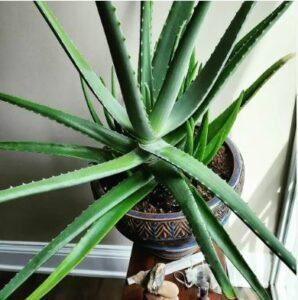
Aloe vera gel has incredible healing powers for the skin. Called “Eti erin” in Yoruba, “Lilis” in Hausa and “Okpochoko” in Ibo, aloe vera effectively treats burns, wounds, rashes, frostbite, psoriasis, sunburns, ulcers and inflammation. It moisturizes dry skin and repairs damaged tissue. Applying fresh aloe gel provides cooling pain relief. Top 15 State Universities with Sports and Athletic Programs in Nigeria
Aloe also benefits hair, teeth and gum health. It is a natural laxative for constipation relief. Regular use lowers fasting blood glucose in diabetics. Aloe vera juice cleanses the digestive tract and colon, acting as a detox. No wonder this succulent plant has earned the nickname “the healing plant.”
5. Azadirachta indica
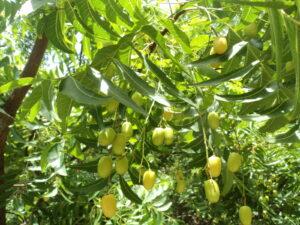
Azadirachta indica, commonly called neem, has potent medicinal powers. Known as “Dongoyaro” in Yoruba and “Darbejiya” in Hausa, neem is used to treat many ailments. It demonstrates anti-inflammatory, antibacterial, antifungal, antiviral, antioxidant and anticancer activities.
Neem leaf paste applied topically heals skin diseases like acne, eczema, ringworm and scabies. Consuming neem tea relieves cough, fever and intestinal worms. Its antimalarial properties treat malaria without side effects. Neem mouthwash promotes oral health. Neem’s wide range of therapeutic effects make it a vital herbal medicine.
6. Vernonia amygdalina
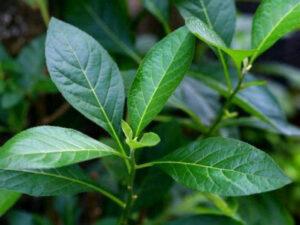
Called “Ewuro” in Yoruba and “Shakwa shiwa” in Hausa, Vernonia amygdalina is a small shrub used medicinally. The leaves treat malaria, gastrointestinal issues, diabetes, fever, wounds, respiratory issues, and female disorders. Bitter leaf has antibacterial effects against drug-resistant microbes. Top 15 Nigerian Casual Wear Brands
Bitter leaf increases uterine muscle contractions and encourages menstruation. It also boosts fertility and improves sexual performance. Extracts made from bitter leaf exhibit anti-cancer activities. The high antioxidant content of bitter leaf leaves helps prevent diseases like diabetes and cancer. No wonder it’s dubbed “the healing herb.”
7. Allium sativum
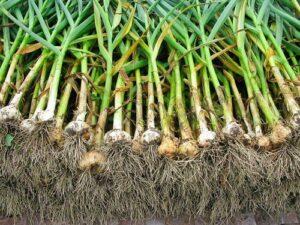
Allium sativum, or garlic, contains the natural chemical allicin which gives it amazing therapeutic powers. In Yoruba it is called “Ayuu,” while the Ibo call it “Ayo-ishi.” Garlic fights bacteria, viruses, and fungal infections. Eating raw garlic combats tuberculosis, diarrhea, malaria, and stomach cancer.
Garlic also improves cardiovascular health. It helps lower blood pressure, cholesterol levels, and coronary heart disease risk. The antioxidant and anti-inflammatory effects also benefit rheumatoid arthritis. Garlic boosts immunity and helps prevent colds. Adding garlic to soups, stews or stir fries boosts the dish’s nutritional value.
Read Also: Top 15 Cholera; Rehydration Therapy, Herbal Teas in Nigeria
8. Cymbopogon citratus
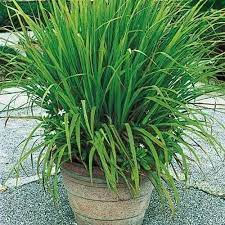
Known as lemon grass, Cymbopogon citratus is used in Nigerian folk medicine for its analgesic, antiseptic and anti-inflammatory properties. Called “Ewe tea” in Yoruba and “Marhaba” in Hausa, lemon grass makes a medicinal tea. NYSC Portal
Lemongrass tea alleviates cough, flu, fever, aches and congestion. It also helps treat diarrhea, stomachaches and gastroenteritis. As a sedative, it aids relaxation and sleep. Lemon grass contains antioxidants that supply antimicrobial, anti-fungal and antioxidant protection. Adding lemon grass to tea, soup or stir fry provides health and flavor.
9. Garcinia kola
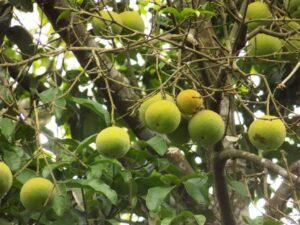
Garcinia kola is called “namijin goro” in Hausa and “orogbo” in Yoruba. The fruits, bark and leaves have medicinal value. Garcinia kola seeds help relieve cough, prevent infections and lower fever from malaria. Chewing the bitter seeds boosts digestion and prevents poisoning.
Studies found Garcinia kola effective for osteoarthritis and knee pain. It also showed antioxidant, anti-inflammatory and antibacterial effects against pathogens like E. coli. Garcinia kola exhibits chemopreventive properties against prostate, hepatic, head and neck cancers. The seed extract may also decrease breast tumor size.
10. Zingiber officinale
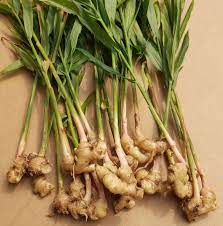
The underground rhizome of the ginger plant is used as a universal herbal remedy in Nigerian culture. Called “Jinja” in Hausa and “Ata-ile” in Yoruba, ginger treats nausea, upset stomach, inflammation and chronic pain. Used for cold relief, ginger opens airways and suppresses coughs. JAMB portal
Ginger also moderates blood sugar, cholesterol and triglycerides. The anti-cancer compounds gingerol and shogaol in ginger demonstrate anti-tumor activities. Ginger is warming, improves circulation and relieves joint pain from arthritis. Adding fresh ginger to meals provides a health and flavor boost.
11. Kalanchoe pinnata
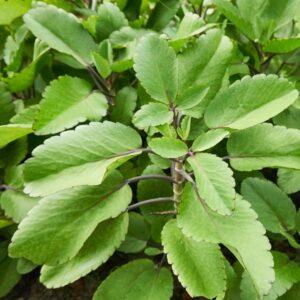
Called “Odundun” in Yoruba, Kalanchoe pinnata is used for treating illness and inducing labor. It has sedative, insecticidal, antibiotic, antimicrobial and antihistamine properties. The juice of Kalanchoe pinnata helps heal fresh wounds, bruises and boils. Leaves applied topically alleviate muscle spasms, joint pain and itching.
Consuming the juice helps treat dysentery, gonorrhea, cough, asthma and urinary tract infections. It also brings on menstruation by stimulating uterine contractions. High in antioxidants, Kalanchoe pinnata prevents infections, reduces inflammation and promotes healing.
Read Also: 15 Best Home Remedies in Nigeria
12. Ocimum gratissimum
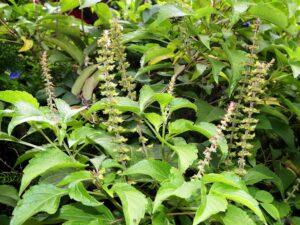
Ocimum gratissimum, known as African basil, is used for various medicinal purposes. The Ibo call it “Nchuawu,” while Yorubas call it “Efinrin-ajase.” Leaves help treat diarrhea, upper respiratory tract infections, pneumonia and conjunctivitis.
Basil is an excellent remedy for different fungal infections like ringworm and athlete’s foot. The antibacterial effects treat skin and wound infections. Besides being an antiseptic, anti-inflammatory and analgesic, basil also prevents seizures and eases depression. Adding basil to food adds antioxidant, antibacterial and anti-inflammatory benefits. JAMB Result
13. Xylopia aethiopica
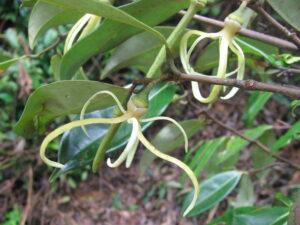
The medicinal fruit of Xylopia aethiopica is used as a spice and herbal remedy. Called “Eru” in Yoruba and “Ciwoh” in Hausa, the pods are added to soups and stews for flavor. Xylopia exhibits analgesic, antioxidant, antitumor, antimicrobial, anti-inflammatory and hypoglycemic properties.
In folk medicine, xylopia pods help relieve sore throat, bronchitis, asthma and rheumatism. Consuming it boosts low appetite and lowers blood pressure. The essential oil derived from xylopia demonstrates activity against drug-resistant microbes like staphylococcus, salmonella and klebsiella. Xylopia has many therapeutic effects in Nigerian culture. 200 romantic love message for her
14. Capsicum annuum
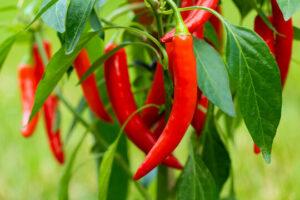
Capsicum annuum refers to hot peppers, including varieties like jalapenos, chili peppers and cayenne peppers. Called “Ata-wewe” in Yoruba, hot peppers have antibacterial, antifungal and analgesic properties. Capsaicin, the compound in hot peppers that makes them spicy, inhibits pain transmission.
In Nigerian folk medicine, hot pepper leaf juice and oil relieve pain. Hot pepper dilated blood vessels to promote circulation and heart health. The bioflavonoids in the peppers act as antioxidants that prevent disease. Adding hot peppers spices up food while offering protective health benefits. 105 good morning messages
15. Abrus precatorius
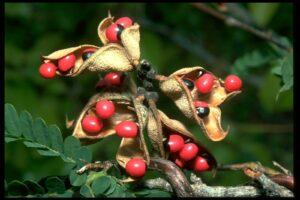
Called “Omisinmisin” in Yoruba and “Gya’ma” in Hausa, Abrus precatorius seeds are used in Nigerian folk medicine to treat typhoid fever and clean sores. Leaves made into a paste help relieve pain and inflammation. The plant has antibacterial effects against pathogens like E. coli and S. aureus.
Extracts of Abrus precatorius demonstrate antioxidant, antimicrobial, antihypertensive and immunomodulatory properties. Compounds extracted from the seeds and leaves show antitumor effects against certain cancers. While ingesting the plant can be toxic, external applications provide medicinal benefits.
Read Also: Top 15 Herbal Teas for Good Health in Nigeria
Conclusion
Herbal medicine has deep roots in Nigerian culture. Many plants offer accessible, natural treatment options. Moringa, aloe, garlic and ginger provide antioxidants, fight inflammation and boost immunity. Neem, bitter leaf, basil and xylopia have antimicrobial effects. Other herbs target specific conditions like high blood pressure, pain, diabetes, skin infections and feminine health concerns.
Although these traditional remedies have long provided healing, more research is still needed regarding proper dosing and potential side effects. It’s best to consult both a healthcare provider and herbal specialist before using any herbal medicine. However, using remedies containing proven medicinal plants can offer a safe, affordable complementary treatment approach.
Nigeria’s wealth of herbal medicine knowledge has been passed down through generations. These 15 remedies only scratch the surface of the country’s expansive herbal pharmacopeia. As interest grows worldwide in returning to ancient herbal traditions, the therapeutic knowledge of Nigerian culture remains relevant. Herbal treatments look set to continue serving Nigerians while also informing modern natural medicine.
Check JAMB Result
Check and Confirm: How much is Dollar to Naira







